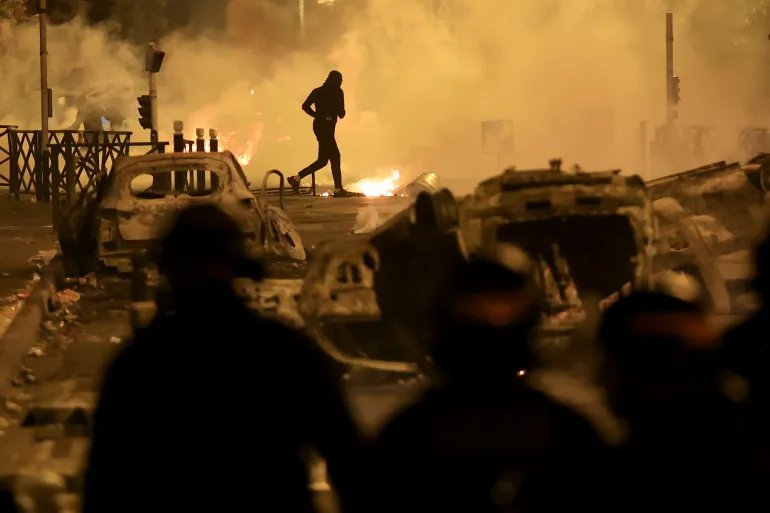France
The Tragic Death Of Nahel: Unveiling The Role Of French Racism In Police Violence

The Tragic Death Of Nahel:
The tragic death of 17-year-old Nahel by French police has once again highlighted systematic racism in France. This tragedy is rooted in colonial racism and brutality. From the Caribbean to the Indian Ocean, France’s colonial past oppressed “non-white.”
The brutality toward Algerians, especially French nationals, is a longtime tradition. French colonization of Algeria began in the early 1800s with brutality and mass deaths. The 1954-1962 Algerian battle for independence cost hundreds of thousands if not over a million deaths.
Police Violence Targeting Black And Arab Communities: A Disturbing Reality
Police aggression in France is not limited to Nahel’s murder. The 1961 massacre of approximately 100 French Arabs during a peaceful Paris rally highlights a worrying tendency. French officials deny systematic racism despite a surge in police murders, mostly of Black and Arab people. Addressing immigration and poverty frequently masks the denial.
Studies show that French police profile and stop Arab and Black young males 20 times more often. The European Commission opposing Racism and Intolerance has long warned about French police racial discrimination, which communities on the ground accept and face demonization and harassment owing to racist ideology.
Denial And The Myth Of Colorblindness: Addressing The Realities Of Racism
France, unlike the U.S., denies racism as a root cause. U.S. racism allows France to minimize its racial intolerance, perpetuating the fiction of French colorblindness. Even renowned African Americans who visited France in the mid-20th century fueled the idea.
Macron called Nahel’s death “inexplicable.” This answer is seen as further French denial of structural racism. France must halt the cycle of governmental brutality and deprivation. To stop other victims like Nahel from joining the centuries-long body count of French oppression, institutional racism must be acknowledged and legislation to combat prejudice and biases implemented.
Read Also: UN Sees France Shooting As Chance To Tackle Police Racism
Cultural Arrogance And Colorblindness: A Barrier To Progress
Cultural arrogance and colorblindness hide France’s institutional racism denial. French officials insist that police murders, which disproportionately impact Black and Arab populations, are the result of “bad apples” rather than a systematic problem. Denial hinders development and fosters violence and tyranny.
White French people prefer to blame immigration and poverty for Nahel’s murder, avoiding the painful truth of systematic racism. The country avoids facing its past and current prejudices by believing in colorblindness. This barrier must be broken by acknowledging racism’s recurring character and committing to its abolition.
The Role Of Media And Political Figures: Shaping Narratives And Perpetuating Denial
Media and politicians shape public opinions, and in France, they typically deny institutional racism. The sad shooting of Nahel revealed a discrepancy between police claims and spectator footage. This discrepancy emphasizes the need for independent media and political leaders to confront police brutality and prejudice.
In reaction to Nahel’s killing, thousands of police officers and tear gas suppressed demonstrations nationwide, supporting the narrative of keeping “public order” rather than confronting systematic racism. Politically controlled media narratives perpetuate denial, slowing systemic change.
Moving Forward: Urgent Need For Policy Reforms And Accountability
Policy changes and accountability are needed as France deals with Nahel’s killing and institutional racism. France’s human rights ombudsperson’s 2020 assessment showing Arab and Black young males are 20 times more possible to be outlined and stopped by police highlights the systemic issue.
Police, employment, education, and politics must work together to combat systematic racism. It requires impartial law enforcement, inclusive legislation, and educational programs battling prejudices. The deaths of victims like Nahel remind us that the actual violence at issue is the human cost of centuries of French tyranny, which must be addressed, recognized, and actively demolished for a more fair and equitable future.
International Perspectives And Solidarity: A Call For Recognition
After Nahel’s death, the international community’s reaction matters. The event triggered demonstrations in France and worldwide attention, raising doubts about the nation’s commitment to combating systemic racism. International activists and campaigners seek acknowledgment and responsibility for France’s Black and Arab populations’ past and present racial injustices.
International unity is vital to ending racism. Sharing experiences and expertise on addressing racial prejudice in law enforcement, education, and government helps improve understanding. The Nahel tragedy highlights the interconnectedness of worldwide battles against racism and police brutality, emphasizing the necessity for cooperation and shared transformation.
Education As A Catalyst For Change: Fostering Understanding And Empathy
Formal and informal education is essential to eradicating systematic racism. Institutions must promote awareness, empathy, and critical thinking regarding racism’s past and current effects. Tragic instances like Nahel’s murder highlight the need for educational programs that challenge stereotypes, encourage inclusion, and present a complete picture of France’s colonial past and its effects on disadvantaged people.
Curriculum improvements should include varied voices and ideas outside of textbooks. This involves addressing French Black and Arab populations’ struggles and colonialism’s impacts. Education can alter society by teaching young people about systematic racism and encouraging them to fight it.
Grassroots Movements And Citizen Activism: Catalysts For Change
Systemic change generally requires institutional policy adjustments, but grassroots movements and citizen participation are vital. Nahel’s killing sparked significant demonstrations and pleas for justice, demonstrating communal action. Marginalized voices may question the denial and colorblindness myth via grassroots campaigns.
Accountability and justice for police brutality and institutional racism are driven by citizen action. These movements’ persistence drives lasting change, pressuring authorities to confront racial injustice. Nahel’s tragedy inspires people fighting structural racism to build a more egalitarian and just society.













You must be logged in to post a comment Login